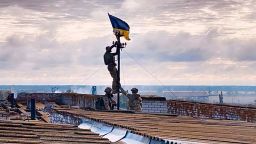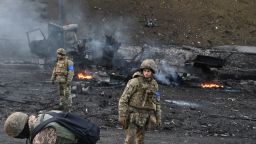The UN Office of the High Commissioner for Human Rights (OHCHR) has documented “filtration” cases, during which “Russian armed forces and affiliated armed groups have subjected persons to body searches, sometimes involving forced nudity, and detailed interrogations about the personal background, family ties, political views and allegiances of the individual concerned,” according to Ilze Brands Kehris, United Nations assistant secretary-general for Human Rights.
“They examined personal belongings, including mobile devices, and gathered personal identity data, pictures and fingerprints. In some cases, those awaiting ‘filtration’ spent nights in vehicles, or in unequipped and overcrowded premises, sometimes without adequate access to food, water and sanitation. We are particularly concerned that women and girls are at risk of sexual abuse during ‘filtration’ procedures,” Brands Kehris said.
The UN OHCHR has also documented cases of men and women “perceived as having ties with Ukrainian armed forces or state institutions, or as having pro-Ukrainian or anti-Russian views” being subjected to torture, arbitrary detention, and “enforced disappearance.”
They were transferred to penal colonies, including the now infamous penal colony near Olenivka, and pre-trial detention centers, where they were interrogated and sometimes tortured to extract a so-called “confession” of their active cooperation with the government of Ukraine.
Some detainees were released after one or two months, while others remain detained as of today, with no or little information for their families about their whereabouts and fate,” Brands Kehris said.
Over 6.9 million people remain internally displaced in Ukraine, with most of the newly-displaced coming from eastern and southern Ukraine. There have been 5,718 civilians killed, including 372 children, and 8,199 injured, 635 being children, during the war so far, Rosemary DiCarlo, UN under-secretary-general for political and peacebuilding affairs, said Wednesday.
DiCarlo added that “these are only verified figures and the actual numbers are likely significantly higher.”
Russia denies forced “filtration” allegations: Refugees and displaced persons in Russia are given health and financial assistance, Russian Ambassador to the UN Vassily Nebenzia said in his remarks to the UN Security Council Wednesday.
He said newcomers go through “registration,” not “filtration” procedures.
It’s very unfortunate that human rights groups are making unfounded allegations against Russia, Nebenzia said. “We have wasted time” discussing this issue rather than real issues, he said.
Nebenzia described the West’s concerns as “fantasies” and said no one is preventing people from leaving Russia. Ukraine is moving people out, even if they are safe in the affected regions, he claimed. “Kiev saboteurs” are attacking areas where people want to leave, charged the ambassador.
“People are fleeing Ukraine, more for fear of Ukraine,” Nebenzia said.











